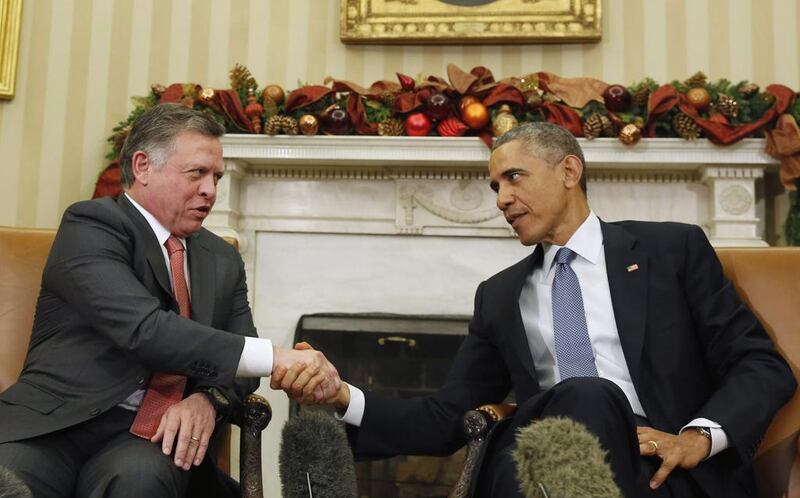Taimur Khan
Foreign Correspondent
WASHINGTON // King Abdullah II urged Arab leaders to take a stronger stance against ISIL, saying the war against the militants was a “fight between good and evil”.
Jordan’s king made the call on a US news programme before meeting Barack Obama at the White House to discuss the fight against ISIL and other issues in the region, including how to find a political solution to the Syrian civil war, the influx of Syrian refugees, escalating unrest in Jerusalem and the status of Iran nuclear negotiations.
Mr Obama said the US would increase bilateral aid to $1 billion (Dh3.67bn) annually and provide an additional loan guarantee, which are subject to Congresional approval.
The increase, which would run through the 2017 fiscal year, “is intended to support Jordan as it faces increasing challenges from regional unrest, a huge refugee presence and high energy costs due to expensive foreign energy imports”, a National Security Council spokeswoman said.
Since 2010, Jordan officially received $660 million annually, but this year is already set to get more than $1 billion in US support as money from separate funds is added to the base annual sum.
The kingdom is a “small, resource-poor country that consistently steps up” to fulfill its regional responsibilities, Mr Obama said after the Oval office talks.
He added that the US-led coalition was making “slow and steady progress” against ISIL, “a long-term and extremely complex challenge”.
King Abdullah said in his earlier interview that he was consulting other Arab leaders about more effective ways to confront the extremist militants, who have taken over large areas of Syria and Iraq – countries that share a border with Jordan.
“Nations in the Arab and Islamic world have to stand up and say, you know, ‘We’re against this,’ and explain to our people, ‘There’s a right and a wrong of this.’
“And people have to make a decision. This is our war. This is a war inside of Islam. So we have to own up to it. We have to take the lead. And we have to start fighting back.
“It’s clearly a fight between good and evil,” he said on CBS This Morning.
Jordan is one of five Arab nations, including the UAE, that have participated in US-led airstrikes against ISIL in Syria.
The countries’ militaries and intelligence services have very close ties – Washington granted Jordan major non-Nato ally status in 1996 – and the US provides $360 million annually in military aid, training and weapons systems to Jordan. Much of this aid focuses on border security and counter-terrorism, and Jordan is home to a US-funded special operations training base.
“Our troops are very proud to be working together to combat ISIL in Syria and Iraq,” King Abdullah said after meeting Mr Obama. “We have a long-term commitment to bring a long-term solution to the region.”
Despite the kingdom’s role in coalition strikes and intelligence sharing, and reports that Jordanian special forces have been involved in action against ISIL, King Abdullah has not sought to publicise Jordan’s military role or to expand it.
Fear of triggering attacks by the group and also managing public opinion domestically are factors in Amman’s approach. Many Jordanians across the political spectrum oppose more robust involvement, either because of Islamist sympathies or out of fear of a backlash.
But King Abdullah’s statements suggest that he may be prepared to do more, especially as frustration builds among regional US allies that the airstrikes in Syria are only empowering Bashar Al Assad to step up attacks on Syrian rebels supported by the coalition.
Mr Obama’s aid pledge was likely at the top of King Abdullah’s list for concrete results from the talks. Jordan’s economy is under severe strain, and the country relies almost entirely on external financial aid from allies in the Gulf and the US, and lending agencies, to keep it afloat.
Jordan closed its borders to Syrian refugees last month as the more than 600,000 Syrian refugees strained already thin resources and has led to social and political disquiet.
Mr Obama and King Abdullah also discussed their efforts to reduce tensions between Israel and Palestine. After the talks, Mr Obama emphasised the need for Palestinians to have a their own state.
Jordan’s UN envoy said on Tuesday she will be trying to get the UN Security Council to agree on a resolution before the end of December that would press for a two-state solution to the Israeli-Palestinian conflict.
The push for Security Council action follows the failure of US-brokered peace talks between Israel and the Palestinians led by US secretary of state John Kerry, this summer’s 50-day war between Israel and Hamas, and the recent upsurge in violence sparked by disputes over Jerusalem’s hilltop complex that is revered by both Muslims and Jews.
Palestinian refugees make up a large proportion of Jordan’s population, and the issue is of significant importance in Jordan’s domestic politics.
tkhan@thenational.ae
* With additional reporting by Associated Press





